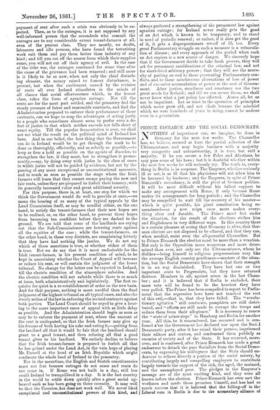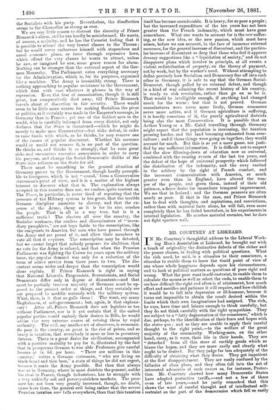PRINCE BISMARCK AND THE SOCIAL DEMOCRATS.
NOTHING of importance can, we imagine, be done in
Germany for the next few weeks. The Chancellor has, we believe, secured at least the partial adhesion of the Ultramontanes, and may begin business with a majority very composite and untrustworthy, it is true, but still a majority. If he can secure a few Poles and Alsatians, he may pass some of his laws ; but it is doubtful whether within the next few weeks he will seriously try. The truth is, every- thing in Berlin is in suspense. The Emperor, whether seriously ill or not, is so ill that his physicians will not allow him to be harassed by business ; and the Emperor, in spite of Prince Bismarck's ascendancy, is still the pivot of German politics. It will be most difficult without his fullest support to make any arrangement with Rome, if only because Rome makes its arrangements for long periods ; and the Chancellor may be compelled to wait till the recovery of his master— which is quite possible, his giant constitution being re- membered—or a new reign once more makes every- thing clear and durable. The Prince must fret under the situation, for the result of the elections strikes him and Englishmen in very different ways. In this country there is a certain pleasure at seeing that Germany is alive, that Ger- man electors are not disposed to be effaced, and that they can, when needful, resist even the all-powerful Chancellor. But to Prince Bismarck the election must be more than a vexation. Not only is the Opposition more numerous and more deter- mined than ever, not only are the Ultramontanes, whom he dislikes—being himself in religious prepossessions very like the average English country gentleman—masters of the situa- tion, but the Social Democrats have shown that their strength is in no way diminished. They have lost one or two important seats to Progressists, but they have returned thirteen Members in all, against seven in the last Cham- ber ; and it is believed that if Berlin is excluded, their mass vote will be found to be the heaviest they have ever polled. The Prince has been compelled to report to Parlia- ment that the repressive laws have not touched the root of this evil,—that is, that they have failed. The " revolu- tionary agitation " still continues, pamphlets are still distri- buted, and "efforts are still made to corrupt the troops and seduce them from their allegiance." It is necessary to renew the " state of minor siege" in Hamburg and Berlin for another year. All this, be it remembered, has occurred and is con- fessed alter the Government has declared war upon the Soci, 1 Democratic party, after it has seized their presses, imprisoned their editors and orators, and condemned them publicly as enemies of society and of the State. It has occurred, more- over, and is confessed, after Prince Bismarck has made a great endeavour to detach the pure Socialists from the Social Demo- crats, by expressing his willingness that the State should en- deavour to relieve directly a portion of the social misery, by contributing largely and compelling employers to contribute largely towards the support of the sick, the aged, the maimed, and the unemployed poor. The pledges in the Emperor's message are of the most exciting kind, and they were all known before the election. Prince Bismarck has even met the workmen and made these promises himself, and has had so much success that it is believed that the falling-off in the Liberal vote in Berlin is due to the momentary alliance of
the Socialists with his party. Nevertheless, the disaffection seems to the Chancellor as strong as ever.
We see very little reason to distrust the sincerity of Prince Bismarck's alarm. and he can hardly be misinformed. He wants, of course, a majority, and he has the Cmsarist feeling that it is possible to attract the very lowest classes to the Throne ; but he would never embarrass himself with stupendous and novel economic plans, or force through repressive laws, which offend the very classes he wants to attract, unless he saw, or imagined he saw, some grave reason for alarm. Nothing can be stronger than the external aspect of the Ger- man Monarchy. The Parliament votes everything necessary for the Administration, which is, for its purposes, organised like a machine. The Army is irresistibly strong. There is nothing approaching to popular resistance to the Government, which does with ease whatever it pleases in the way of repression. Even the fear of assassination, though it is still great, has comparatively died away, till Prince Bismarck travels about at discretion in fair security. There would seem to be little more reason for making Socialism the pivot of politics, as it certainly was made in the Emperor's message, in Germany than in France ; yet one of the boldest men in the world, who is carefully informed from every district, not only declares that the State is threatened—which he might do merely to make men Conservative—but risks defeat, in order to raise funds with which, as he thinks, he may remove one of the causes of popular discontent. Whether his measure would or would not remove it, is no part of the question. He thinks so, and thinks it so strongly, that he runs great risks and encounters excessive annoyances in order to carry his purpose, and change the Social-Democratic dislike of the State into reliance on the State for aid.
There must be something in the general situation of 'Germany patent to the Government, though hardly percepti- ble to foreigners. which is not " sound," from a Conservative statesman's point of view, and it is a matter of the highest interest to discover what that is. The explanation always accepted in this country does not, we confess, quite content us. The Threes, in particular, is never tired of repeating that the pressure of the Military system is too great, that the terrible German discipline amounts to slavery, and that the ex- pense of the Army, cheap as it is for its size, crushes -the people. That is all in a way true, but is it a
sufficient truth The electors all over the country, the . Socialist workmen, the readers and disseminators of " incen- diary pamphlets," are not boys liable to the conscription, like the emigrants to America, but men who have passed through the Army and are proud of it, and allow their members to vote all that it requires. The conscription may be detested, but we cannot forget that nobody proposes its abolition, that . no vote for the Army is refused, and that when the Prussian Parliament was fighting the Crown for years upon the military issue, the popular demand was only for a reduction of the term of active service from three years to two. The dis- content seems wider and deeper than the conscription would alone explain. If Prince Bismarck is right in saying that National Liberals, Progressists, Secessionists, and Social .Democrats differ only in degree of discontent—and that must be partially true—a majority of Germans must be op- posed to the present order of things, and they certainly are not prepared to meddle seriously with the military system. What, then, is it that so galls them? The want, say many .Englishmen, of self-government ; but, again, is that explana- tory? After all, Prince Bismarck does not legislate or tax -without Parliament, nor is it yet certain that if the united popular parties would embody their desires in Bills, he would advise the very extreme course of vetoing them by royal authority. The evil, say another set of observers, is economic. So poor is the country, so great is the rise of prices, and so heavy is taxation, that everybody is more or less in pecuniary distress. There is a great desire for civilisation, accompanied with a positive inability to pay for it, illustrated by the fact that in prosperous German towns able Professors give careful lessons at Is. Gd. per hour. " There are millions in this country,- writes a German statesman, " who are living on black bread and thin beer," a state of things he did not regret, because it made the Army possible. But then that always was so in Germany, where in most districts the peasant, unlike his rival in France, though industrious, has to struggle with a very unkin sly soil and poverty-stricken markets. The pres- sure ha; not been very greatly increased, though, no doubt, taxes have risen, the general evil being rather that the severe Prussian taxation now falls everywhere, than that this taxation itself has become unendurable. It is heavy, for so poor a people ; but the increased expenditure of the ten years has not been greater than the French indemnity, which must have gone somewhere. What one wants to account for is the new suffer- ing, or the new idea, or the new passion, which must have arisen, before we can account, in the face of immense external successes, for the general increase of discontent, and the particu- lar increase of discontent so deep that those who feel it approve dreamy suggestions like a " liquidation of society," and do not disapprove plans which involve in principle, at all events, a violent redistribution of property, on the theory of payment, not by work, but by the worker's need. Without attempting to define precisely how Socialism and Democracy fine off into each other in Germany, it is safe to say that the German Social- Democrat, though galled by no external defeat, and though in a kind of way admiring the recent history of his country, is ready to risk revolution, rather than go on as he is. That would be intelligible enough,_ if anything had changed much for the worse ; but that is not proved. German manufactures were never more lively, German commerce never more active, and if German agriculture is suffering, it is hardly conscious of it, the purely agricultural districts being also the most Conservative. It is possible that an Arthur Young or a Mr. Caird travelling through Germany might report that the population is increasing, the taxation pressing harder, and the land becoming exhausted from over- culture ; and if those things were going on together, they would account for much. But this is as yet a mere guess, not justi- fied by any sufficient information. It is difficult not to suspect that the slow filtering-down of education now so universal, combined with the rousing events of the last ten years, and the defeat of the hope of universal prosperity which followed the distribution of the indemnity, and the envy excited in the soldiery by the sight of French comfort, and the incessant communication with America, so much greater even than in England, have altered the tem- per of the people, and given them, instead of their old patience, a fierce desire for immediate temporal improvement.
We see that in Ireland ; and the German peasants are often nearly as poor. If that is the case, and Prince Bismarck has to deal with thoughts, and aspirations, and convictions, rather than with material facts alone, he will fail, even more completely than he has failed heretofore, in his experiments in internal legislation. He crushes material enemies, but he does not fight spectres well.



































 Previous page
Previous page